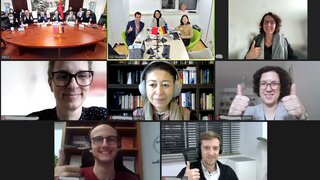7th Sino-German Working Group Meeting on Energy Efficiency
On 20 January 2022, the 7th annual meeting of the Sino-German Working Group on Energy Efficiency between the German Federal Ministry for Economic Affairs and Climate Action (BMWK) and the National Development and Reform Commission of the PRC (NDRC) took place virtually. Both sides reviewed the working group's activities and achievements in 2021, agreed on the work plan for 2022, and expressed their strong commitment to deepen and further the bilateral cooperation. Deputy Director General Ulrich Benterbusch from the Energy Policy Department of BMWK, and Deputy Director General Zhao Penggao from the Department of Environment and Resource Conservation of NDRC headed the meeting.
„The new German government has made climate protection a top priority. To achieve carbon neutrality by 2045, the new government has proposed to bring forward the deadline for phasing out coal from 2038 to, ideally, 2030. Germany will will shut down the last nuclear power plants this year. In the future, Germany will apply more renewable energy, and by 2030, the share of renewable power generation will grow from the current 42% to 80%. Meanwhile, Germany plans to achieve a 30% reduction in end-use energy demand by 2030 compared to 2008, and will further strengthen the role of energy efficiency. For Germany, it is important to continue the deep cooperation and mutual exchange with China in advancing energy efficiency and the energy transition,“ stressed Mr. Benterbusch in his opening remarks..
“China has made positive progress in its efforts to achieve carbon peaking and neutrality by issuing overarching climate policy documents, the "1+N" policy framework, actively participating in international exchanges and cooperation on climate change, and increasing the consensus and actions of the whole society to promote green, low-carbon and circular development. In the “1+N” policy, the Chinese government has made energy efficiency an important principle by emphasizing the need to ‘give priority to saving energy and resources and implement a comprehensive energy saving strategy,” stressed Deputy Director General Zhao Penggao in his speech.
In the following sessions, both sides reviewed the activities and achievements of 2021 and discussed the working plan for 2022. Both sides agreed on widening the cooperation energy efficiency standards, and continue the cooperation within the two Sino-German demonstration projects on energy efficiency industry and cities. Furthermore, the parties approved the planned activities of the Sino-German cooperation field on energy efficiency network, which is currently implemented in Taicang (Jiangsu Province).
Participants included, amongst others, representatives from BMWK, NDRC, the German Embassy in Beijing, the German Federal Ministry for the Environment (BMUV), GIZ, the German Energy Agency (dena), the National Energy Conservation Center of China (NECC), the China Energy Conservation and Environmental Protection Group (CECEP Consulting) and China International Engineering Consulting Corporation (CIECC).
Deutsche Gesellschaft für Internationale Zusammenarbeit (GIZ) GmbH implements the Sino-German Energy Partnership on behalf of the German Federal Ministry for Economic Affairs and Climate Action (BMWK).
For more information on the Sino-German Working Group on Energy Efficiency, please contact:
Ms. Yin Yuxia (yuxia.yin(at)giz.de)
Project Director of the Sino-German Energy Partnership, GIZ
